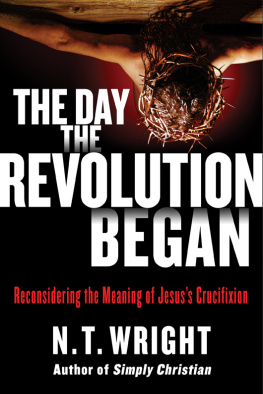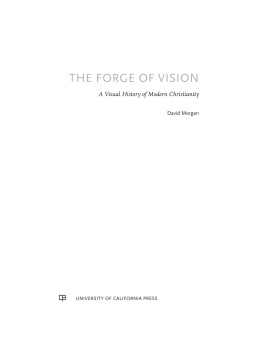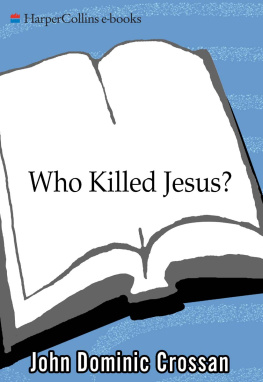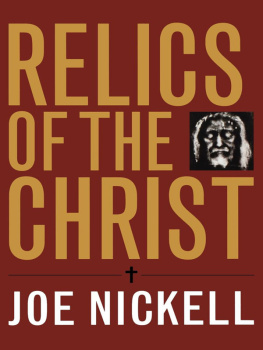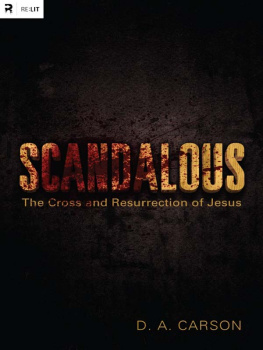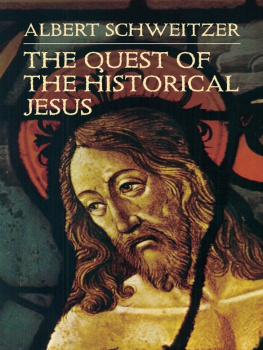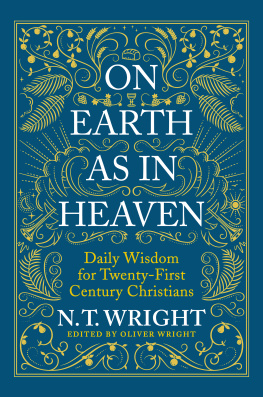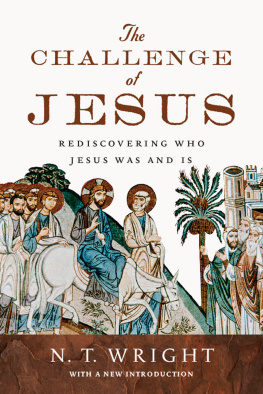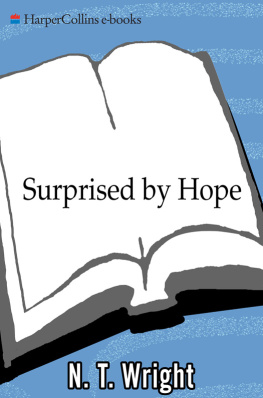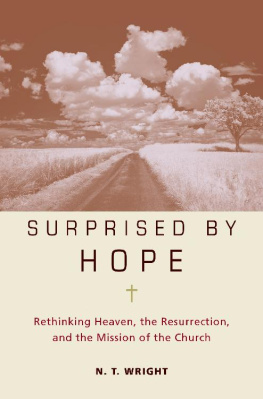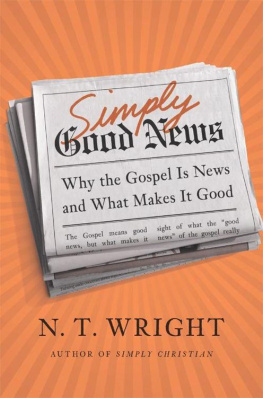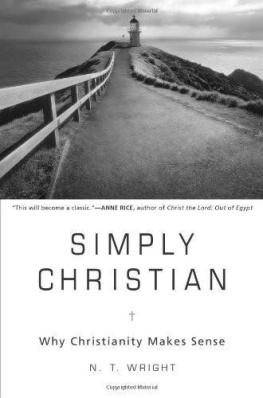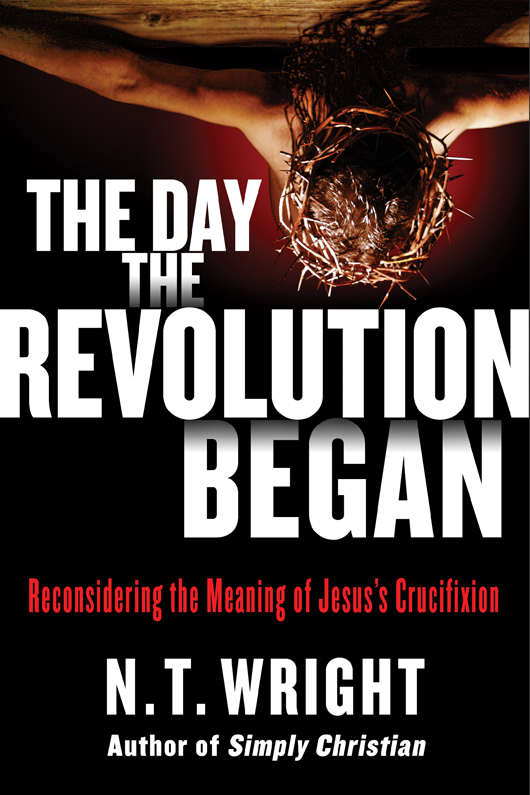For Leo
Look! The Lion has won the victory!
(Revelations 5.5)
CONTENTS
- 1. A Vitally Important Scandal
Why the Cross?
- 11. Paul and the Cross
Apart from Romans - 12. The Death of Jesus in Pauls Letter to the Romans
The New Exodus - 13. The Death of Jesus in Pauls Letter to the Romans
Passover and Atonement
Guide
Y OUNG HERO WINS HEARTS . Had there been newspapers in Jerusalem in the year we now call AD 33, this was the headline you would not have seen. When Jesus of Nazareth died the horrible death of crucifixion at the hands of the Roman army, nobody thought him a hero. Nobody was saying, as they hurriedly laid his body in a tomb, that his death had been a splendid victory, a heroic martyrdom. His movement, which had in any case been something of a ragtag group of followers, was over. Nothing had changed. Another young leader had been brutally liquidated. This was the sort of thing that Rome did best. Caesar was on his throne. Death, as usual, had the last word.
Except that in this case it didnt. As Jesuss followers looked back on that day in the light of what happened soon afterward, they came up with the shocking, scandalous, nonsensical claim that his death had launched a revolution. That something had happened that afternoon that had changed the world. That by six oclock on that dark Friday evening the world was a different place.
Nonsensical or not, they were proven right. Whether we believe in Jesus, whether we approve of his teaching, let alone whether we like the look of the movement that still claims to follow him, we are bound to see his crucifixion as one of the pivotal moments in human history. Like the assassination of Julius Caesar around seventy years earlier, it marks the end of one era and the start of another.
And Jesuss first followers saw it as something more. They saw it as the vital moment not just in human history, but in the entire story of God and the world. Indeed, they believed it had opened a new and shocking window onto the meaning of the word God itself. They believed that with this event the one true God had suddenly and dramatically put into operation his plan for the rescue of the world.
They saw it as the day the revolution began.
It wasnt just that they believed Jesus had been raised from the dead. They did believe that, of course, and that too was scandalous nonsense in their day as it is in ours. But they quickly came to see his resurrection not simply as an astonishing new beginning in itself, but as the result of what had happened three days earlier. The resurrection was the first visible sign that the revolution was already under way. More signs would follow.
Most Christians today dont see it like thisand, in consequence, most people outside the church dont see it like that either. I understand why. Like most Christians today, I started my thinking about Jesuss death with the assumption, from what I had been taught, that the death of Jesus was all about God saving me from my sin, so that I could go to heaven. That, of course, can be quite a revolutionary idea for someone whos never thought of it before. But its not quite the revolution the early Christians were talking about. In fact, that way of putting it, taken on its own, significantly distorts what Jesuss first followers were saying. They were talking about something bigger, something more dangerous, something altogether more explosive. The personal meaning is not left behind. I want to make that clear from the start. But it is contained within the larger story. And it means more, not less, as a result.
Let me put this another way. The early Christian writers used some stunning expressions of delight and gratitude when they mentioned Jesuss death. Think of Paul saying, He loved me and gave himself for me (Gal. 2:20), or The Messiah died for our sins in accordance with the Bible (1 Cor. 15:3). Think of John writing perhaps the most famous line in the New Testament, God so loved the world, that he gave his only begotten Son (3:16, KJV ). The focus in all these cases is upon Jesuss death on the cross, not the resurrection. These must remain central in any authentic description of what the first Christians believed had happened when Jesus died. But by themselves, without paying attention to the larger elements in the picture, they can lead us into a private or even selfish way of seeing things, in which our immediate needs may seem to have been met (our needs for forgiveness in the present and salvation in the future), but without making any difference in the wider world.
Some, indeed, make a virtue of that irrelevance. This world is not our home, they say. Jesus has rescued us, and hes taking us somewhere else. But the early Christians were clear: Jesuss death made all the difference in the world, all the difference to the world. The revolution had begun. In this book I want to show what that means and how a fuller vision of what happened when Jesus died, rooted in the New Testament itself, can enable us to be part of that revolution. According to the book of Revelation, Jesus died in order to make us not rescued nonentities, but restored human beings with a vocation to play a vital part in Gods purposes for the world. Understanding what exactly happened on that horrible Friday afternoon is a big step toward making that vocation a reality.
But whether we understand it or not, there is no denying that the sheer fact of Jesuss crucifixion and the symbol of the cross itself still carry enormous power in our world. We need to think about this for a moment before going any farther. It forces us to ask, again, the key question: Why?
Captivated by the Cross
Someone recently drew my attention to an energetic, youthful organization calling itself the Jesus Army. It has, of course, a website, and I confess that when I first looked at it, I was expecting trite clichs and tired slogans. Not at all. It had the feel of fresh discovery and embraced a wider variety of spiritual traditions and practical programs than I had anticipated. But at its heart it remained deeply traditional, as you can see in the posting that caught my eye. This short piece places the spotlight on the crucifixion of Jesus of Nazareth, the event that forms the subject of this book. It draws our attention to the strange, perhaps even revolutionary power that this event still appears to possess, despite all the skepticism and sneering of todays world:
YOU cant get away from it. Its everywhere.
The cross.
In homes, in films, in paintings, in pop videos. Worn as an earring, on a necklace. Stitched or studded onto leather or denim. Tattooed onto skin...
What would Coca-Cola or McDonalds give to own a symbol that millions wear around their necks every day?
The cross is the universal Christian symbol, acknowledged by millions of Christians everywhere as the single visual sign of their faith.
Which is weird, isnt it? Because the cross was originally a symbol of suffering and defeat. The Roman Empire killed thousands of its enemies by nailing them to wooden crosses.
Its like wearing a gibbet around your neck. Or hanging a little golden lethal injection from your necklace.
Jesus Christ was executed 2,000 years ago by the Romans. But Christians believe Jesus didnt stay deadthat Jesus beat death and rose again, beyond deaths reach.
That makes the cross not a sign of death, but a sign of the end of death.
A sign of hope, a sign of possibilityfor every human being.
Thats why Christians wear crosses.
The Jesus Army wear and give away bright red crosses. Jesus Army member Chris, 38, says, We give away hundreds of crosses. People like them. They glow in UV light, which makes them popular with clubbers! But all sorts of people like them and use them to help them to think about God or to pray.

